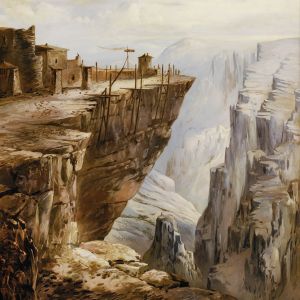Tor-Kelai
| Tor-Kelai | |
|---|---|
| Image |  |
| Type | Cliffside Observation Outposts in the Sanctuary Vale |
| Location | Northern edge of the Citadel Mountains, overlooking eastern approaches to Sanctuary Vale |
| Realm | Terasil |
| Region | Sanctuary Vale |
| Subregion | Northern Expanse |
| Inhabitants | Orasian |
| Controlled by | Council of Kar-Thal |
| Significance | High-elevation watchpoint overseeing movement through the eastern fracture corridor |
Introduction
Tor-Kelai is a cliffside outpost positioned above the southern edge of the border between the Fractured Wedge and the Sanctuary Vale. It serves as a strategic observation and early-warning station, monitoring movement and environmental change along the overland corridor north of Varn-Telai. The outpost is minimally staffed and primarily used for tracking and signaling.
Geography
The outpost is situated atop a high rock ledge with a direct view across the fractured terrain leading toward Tharn Gate. The cliff face is angular and narrow, with a sheer drop to the layered faults below. The buildings are constructed along the spine of the ridge, anchored with vertical support beams and built from weight-distributing stone. The location allows for wide visual coverage.
History
Tor-Kelai was established to close a blind spot in the northern observation network during early efforts to regulate surface traffic into the Vale. The outpost's elevation and natural wind buffering made it suitable for long-range relay functions. Initial structures were temporary, later replaced with reinforced facilities.
Culture and Ritual
Tor-Kelai is operated by a skeleton crew, usually no more than three individuals on alternating shifts. Most communication is conducted through signals or logs. Personnel are expected to maintain observational accuracy and limit nonessential activity.
Threats and Dangers
Primary threats include high wind exposure, limited maneuverability, and structural risk due to shifting cliff edges. Safety rails and anchor systems are maintained, but extended use is limited due to fatigue and terrain stress.